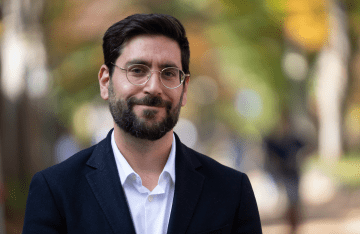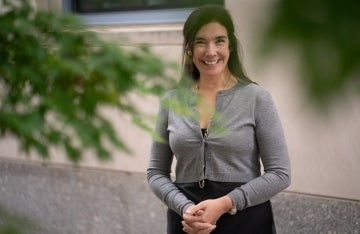Duncan Watts Elected to the National Academy of Sciences
Watts was one of four distinguished scholars from Penn recognized for their innovative contributions to original research.

Newly elected members of the U.S. National Academy of Sciences (clockwise from top left): David Brainard; Duncan Watts; Kenneth S. Zaret; and Susan R. Weiss
Four faculty from the University of Pennsylvania have been elected to the United States National Academy of Sciences (NAS). They are David Brainard of the School of Arts & Sciences; Duncan Watts of the Annenberg School of Communication, School of Engineering and Applied Science, and Wharton School; and Susan R. Weiss and Kenneth S. Zaret of the Perelman School of Medicine.
They join 120 members and 23 international members elected by their peers this year to NAS. Recognized for “distinguished and continuing achievements in original research,” this new class brings the total number of active members to 2,565 and of international members to 526.
David Brainard is the RRL Professor of Psychology, director of the Vision Research Center, and associate dean for the natural sciences in the School of Arts & Sciences. His research focuses on human vision, using both experiments and computer modeling of visual processing, to understand how the visual system deciphers information about objects from light entering the eye. Specifically, he and his lab are interested in color vision, conducting psychophysical experiments to investigate how the appearance of color is affected by an object’s surface properties and ambient light, and how color perception aids in identifying objects. Brainard is the recipient of many honors, including the Macbeth Award from the Inter-Society Color Council, Stein Innovation Award from Research to Prevent Blindness, and Edgard D. Tillyer Award from Optica. He is an elected member of the Society of Experimental Psychologists, a Silver Fellow of the Association for Research in Vision and Ophthalmology, and a Fellow of the Association for Psychological Science.
Duncan Watts is the Stevens University Professor and the 23rd Penn Integrates Knowledge University Professor at Penn. He holds faculty appointments in the Department of Computer and Information Science in the School of Engineering and Applied Science, the Annenberg School for Communication, and the Department of Operations, Information and Decisions in the Wharton School, where he is the inaugural Rowan Fellow. He also holds a secondary appointment in the Department of Sociology in the School of Arts & Sciences. Watts is a computational social scientist interested in social and organizational networks, collective dynamics of human systems, web-based experiments, and analysis of large-scale digital data, including the production, consumption, and absorption of news. He was named an inaugural fellow of the Network Science Society in 2018, a Carnegie Fellow in 2020, and a fellow of the American Association for the Advancement of Science in 2021.
Susan R. Weiss is a professor and vice chair of the Department of Microbiology and co-director of the Penn Center for Research on Coronaviruses and Other Emerging Pathogens at the Perelman School of Medicine. She has worked on many aspects of coronavirus replication and pathogenesis, making contributions to understanding its basic biology, as well as organ development and virulence. Her recent research has focused on coronavirus interaction with the host innate immune response and viral innate antagonists of double-stranded RNA-induced antiviral pathways. Weiss’ other research interests include the activation and antagonism of a certain antiviral enzymatic pathway, Zika virus-host interactions, and pathogenic effects of host endogenous double-stranded RNA. She was named a fellow of the American Association for the Advancement of Science in 2008.
Kenneth S. Zaret is the Joseph Leidy Professor in the Department of Cell and Developmental Biology at the Perelman School of Medicine, director of the Institute for Regenerative Medicine, and a member of the Cell and Molecular Biology Graduate Program. His research focuses on gene regulation, cell differentiation, and chromatin structure, with a goal of elucidating these phenomena in the context of embryonic development and tissue regeneration. Pinpointing these aspects of development at the cellular level can serve as the basis for developing future therapeutics and experimental models that further scientists’ ability to understand and cure disease. Zaret has been the recipient of many honors, including a MERIT Award from the National Institutes of Health, the Stanley N. Cohen Biomedical Research Award, and election as a fellow of the American Association for the Advancement of Science.
The complete list of new NAS members is available on the Academy’s website.



